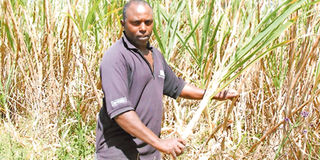Paying dairy farmers based on milk quality instead of quantity will curb contamination menace, say experts

Dairy farmer, Samwel Mambo in his nappier grass farm in Rongai, Nakuru. He keeps 25 dairy cows and experts advice that paying dairy farmers based on the quality of the milk they produce, instead of the quantity of the milk, will help curb the milk contamination menace. PHOTO | JOHN NJOROGE | NMG
What you need to know:
- Emmanuel Kabaki, the general manager, milk procurement and extension services at Brookside Dairy, said a number of players in the value chain are messing up with milk.
- To remedy the situation, the experts recommended the use of quality-based payment system.
- According to the dairy board, 70 per cent of the sector is still informal hence compounding the quality challenges.
- Philip Kipkorir, a farmer from Kapseret in Uasin Gishu County, said a lot needs to be done to empower livestock farmers.
Dairy experts have raised concern over increased presence of antibiotics and aflatoxins in milk and milk products.
During a meeting on milk quality and safety in Nairobi this week, which brought together stakeholders in the industry, the experts observed that a lot of milk sold in the market has the poisonous substances due to feeds and poor animal husbandry.
“Most of the feed manufacturers do not take care of the quality of their products. Aflatoxins have been noticed in milk and therefore we are working on a law that will regulate the animal feeds sector,” said Harry Kimutai, the principal secretary for livestock at the workshop organised by SNV-Kenya, Kenya Dairy Board (KDB) and 3R Program.
Emmanuel Kabaki, the general manager, milk procurement and extension services at Brookside Dairy, said a number of players in the value chain are messing up with milk.
“There is water adulteration, addition of chemicals to prolong the life of milk, use of fat, margarine, maize flour, sugar and some people even use soap to preserve milk,” he said.
Research shows that resistance to antibiotics among human beings is on the increase and milk has been cited as one of the sources of the drugs.
“If you do not observe the withdrawal period after injecting a cow with antibiotics, the drug residues will be found in milk and when consumed, they cause challenges, that is why you hear of issues of resistance,” said Margaret Kibogy, the managing director of KDB.
To remedy the situation, the experts recommended the use of quality-based payment system.
“The farmers are being paid on the basis of quantity and not quality of produce. So if we introduce quality-based payment system, then the farmers are going to produce milk and they will be incentivised to take care of the quality of the milk as well,” Kimutai noted.
The workshop brought together stakeholders in the milk value chain including farmers, transporters, processors and policymakers in bid to deliberate on sustaining the dairy industry by identifying the challenges facing it and how to mitigate them.
According to the dairy board, 70 per cent of the sector is still informal hence compounding the quality challenges.
LACK EDUCATION ON MILK PRODUCTION
“We are working together with all the stakeholders in the dairy value chain both at the national and county governments and development partners to be able to address how we can move the sector from informal to formal,” said Kibogy.
Philip Kipkorir, a farmer from Kapseret in Uasin Gishu County, said a lot needs to be done to empower livestock farmers.
Kipkorir admitted that most farmers lack education on matters quality milk production. “Small-scale farmers talk about aflatoxin and antibiotics but require education to enable them understand the consequences of feeding their animals fodder which has aflatoxins,” he said.
The role of consumers was also highlighted, with Daniel Asher, the programmes officer, CUTS International, advocating for increased consumer awareness.
“Consumers really need to come out and demand for accountability along the value chain,” said Asher.
Agriculture is a devolved function, thus, participants challenged the county governments to invest more in extension services to empower farmers to produce quality milk.
“We in the counties are ready even to police whoever is engaging in bad practices to ensure we end up with quality milk,” said Albert Mwaniki Ngungu, the Agriculture executive, Murang’a County.
Findings by the International Food Policy Research Institute indicate that there are potential pathogens in 30 per cent of milk sold to the public by vendors in Kenya.
Vivian Hoffman, a research fellow at the institute, urged consumers to take up the precautionary role while consuming milk at home.
One of the mechanisms the institute suggests is boiling milk, which she said is the number one safety measure.
“Milk could be contaminated during the packaging process, so consumers need to be boiling milk because quality does not just end at packaging. Our findings show that milk from supermarkets could still have some pathogens,” she said.




